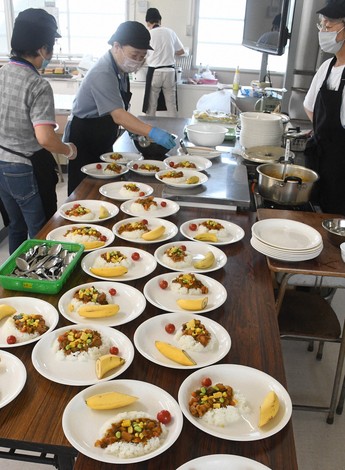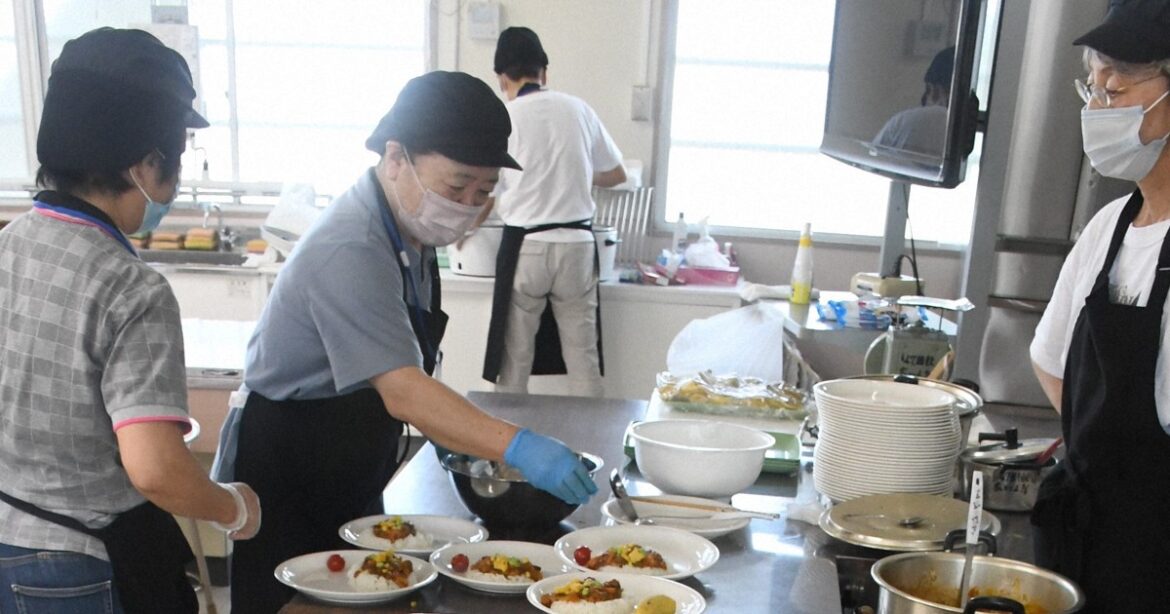
Cooking staff prepare “summer vegetable chicken curry” at a “children’s breakfast cafeteria” at an elementary school in Izumisano, Osaka Prefecture, on July 1, 2025. (Mainichi/Tadakazu Nakamura)
IZUMISANO, Osaka — An initiative to provide free breakfast to elementary school students twice a week before classes in this west Japan city has been well received.
The Izumisano Municipal Government plans to expand this “children’s breakfast cafeteria” program to all 13 schools in the city this fall. The number of children using the service has exceeded the city’s expectations. A city official explained, “By helping children make it a habit to eat breakfast, we are supporting a healthy and fulfilling school life.”
On a Tuesday morning in early July, at 7:40 a.m., children energetically entered the home economics room at the municipal Chounan Elementary School. That day’s menu featured “summer vegetable chicken curry,” which included not only carrots and onions, but also pumpkin, green peppers, “shimeji” mushrooms, eggplant, edamame and corn. Cherry tomatoes and bananas were also served.
A sixth grade boy commented, “It’s fun to eat with friends.” Meanwhile, a fifth grade girl said with a smile, “I feel energized. When I eat breakfast at home, I get hungry by the end of the second period, but on days I use the breakfast cafeteria, I can hold out until the third period.”
By 8:30 a.m., the children headed to their respective classrooms. On this day, 47 students used the service, accounting for 15% of the entire student body. The school’s principal, Mikito Yoshioka, commented, “The children enjoy eating breakfast together with peers from different classes and grades, smiling and creating a pleasant atmosphere. It’s wonderful to see them head to class with energy.”

“Summer vegetable chicken curry” is served at a “children’s breakfast cafeteria” at an elementary school in Izumisano, Osaka Prefecture, on July 1, 2025. (Mainichi/Tadakazu Nakamura)
The breakfast menu for June and July at this school included dishes like omelet, beef bowls and ramen. Satoko Tsujino, 63, the head of cooking, said, “I use ingredients that children may not like much, hoping they’ll at least try them. Seeing the lively atmosphere makes me happy, thinking, ‘They’re energetic today, too.'”
The service is available to any student who wishes to use it. The initiative began after a meeting in the fall of 2022, where the mayor listened to citizens’ opinions on municipal administration. A resident who watches over children commuting to school expressed concern about them not eating breakfast due to family circumstances, and requested that “something be done to ensure that children eat breakfast, so as to help them gain academic and physical strength.”
The city started a pilot program at Nagasaka and Chuou elementary schools in February 2023. A questionnaire conducted at that time revealed that about 20% of children did not eat breakfast at home, citing reasons like waking up late or parents being unable to prepare meals due to work.
The municipal government increased the number of participating schools to 12 for the 2024 academic year and plans to expand the service to all 13 municipal elementary schools, by adding Hineno Elementary School in September. The general budget for this fiscal year allocates 97.03 million yen (roughly $653,000) for the initiative, with cooking and operations outsourced to five vendors. The number of children using the service citywide has exceeded expectations, reaching over 20%.
The city’s child support division explained, “The program is contributing to improving lifestyle habits, eliminating ‘solitary eating’ and creating a place for interaction. Although it cannot be quantified, it has had a certain effect in promoting motivation to attend school by looking forward to eating breakfast at the cafeteria and encouraging their willingness to learn.”
(Japanese original by Tadakazu Nakamura, Izumisano Resident Bureau)


AloJapan.com